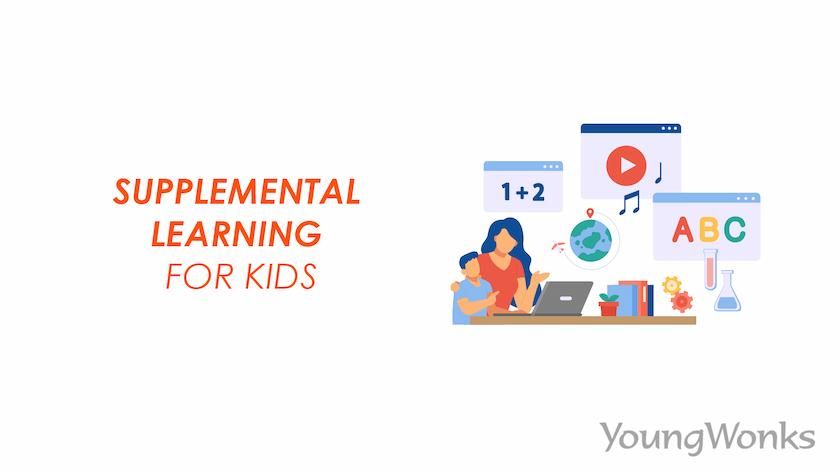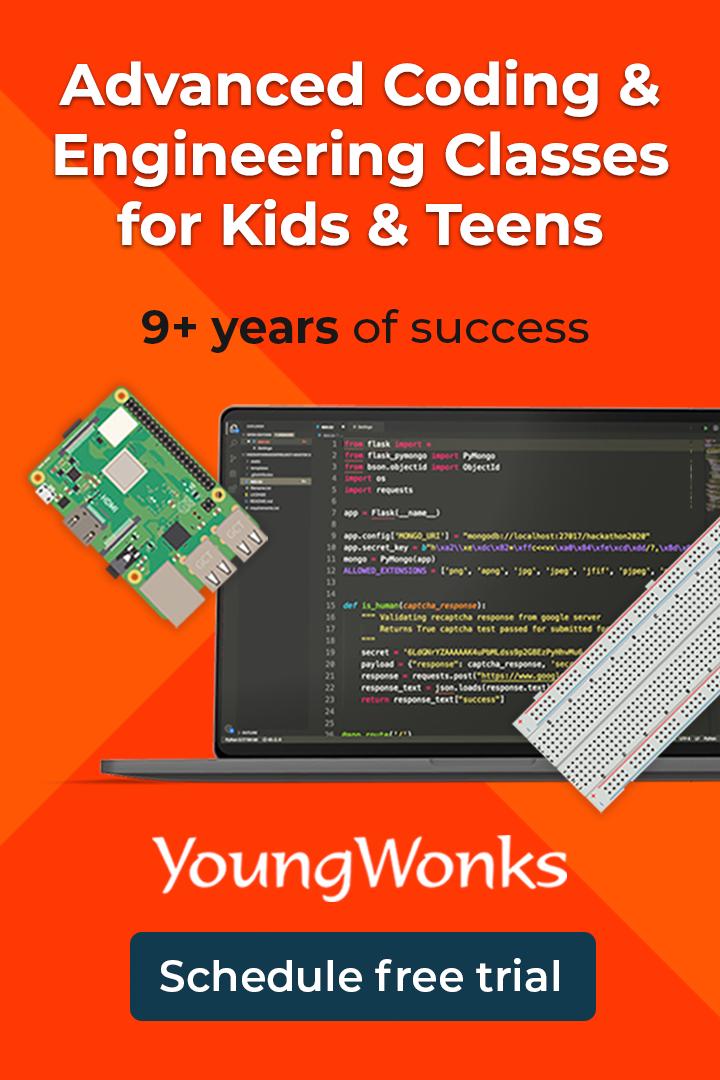Jul 30, 2024 By Team YoungWonks *
What is Supplemental Learning?
Supplemental learning refers to educational activities, lessons, or programs that go beyond the standard school day. These help meet your child’s learning needs or offer enrichment in areas they’re curious about.
- Can include online courses, after-school programs, summer camps, or weekend classes.
- Designed to boost academic performance and support kids who need extra support.
- Great for enrichment to help children go beyond their grade level or explore topics not always covered in class.
Why Is Supplemental Learning Important?
Every child is different. One-size-fits-all teaching doesn't always work in a traditional school. Supplemental learning opportunities help your child grow at their own pace.
- It doesn't replace your regular school—it adds more power to it.
- Helps meet individual needs and child's needs.
- Gives students time to develop essential skills like critical thinking and problem-solving skills.
- It can happen at home, in after-school programs, online, or in small groups.
- It gives extra practice for tough topics like math, reading, and science.
- It supports academic performance and builds confidence.
Types of Supplemental Learning Activities
There are many types of supplemental learning activities that can enhance a child’s learning experience:
1. Math programs
Strengthen number skills or prepare for advanced math with top platforms like
- Art of Problem Solving (AoPS): Designed for students excelling in math, with a focus on problem-solving and competition preparation.
- Beast Academy: Created by the Art of Problem Solving team, it’s designed for students in grades 1–5. It uses engaging comic-style lessons and challenging problems to build deep mathematical thinking skills.
2. Reading programs
Encourage literacy and help children who need reading support.
- Starfall: Fun, interactive lessons for early reading and phonics.
- Raz-Kids: Online books and quizzes to help improve reading skills.
- Reading Rockets: Resources and strategies for children needing reading support.
- Epic!: A digital library with books, audiobooks, and educational videos for children.
3. Educational activities
Science experiments, coding games, history scavenger hunts.
- NASA for Kids: nteractive games and activities related to space exploration.
- Code.org :Free coding tutorials and activities for students of all ages.
- National Geographic Kids: Fun and educational science activities, facts, and games.
- Smithsonian Learning Lab: History, science, and art learning tools with interactive exhibits and resources.
4. Online courses
Flexible, self-paced options for any subject.
- YoungWonks: Provides comprehensive coding and engineering classes for kids and teens, covering topics from Scratch programming to advanced machine learning.
- Outschool: Offers live, online classes for kids ages 3–18 on a huge range of topics—from core subjects to hobbies like gaming, art, and cooking.
- Adventure Academy: A game-based learning platform for kids ages 8–13 that teaches reading, math, science, and social studies through exploration.
- ABCmouse: An early learning app for kids ages 2–8 with over 10,000 activities in reading, math, science, art, and music.
- BrainPOP: Animated educational videos and activities for ages 6–17 that make learning subjects like science and math fun and engaging
5. Hands-on projects
DIY kits, art classes, and science experiments to bring learning to life.
- KiwiCo: DIY kits and hands-on learning projects for kids in science, art, and engineering.
- Art for Kids Hub: Fun art lessons and tutorials for kids of all ages.
- Science Buddies: Science fair project ideas, experiments, and kits for students.
6. Language learning
Apps or games to explore Spanish or other languages
- Duolingo: Free and fun language learning app for students of all ages.
- Babbel: Language learning platform with interactive lessons.
- Rosetta Stone: A well-known language learning platform with immersive methods.
Why Do Kids Love Supplemental Learning?
Supplemental learning is often more fun and exciting than the usual school routine. Here’s why kids enjoy it:
- It’s flexible and fits into your own pace. If something is hard, you can take your time. If something is easy, you can move ahead.
- It focuses on you as an individual. You learn based on your learning style whether you learn better by watching, doing, reading, or listening.
- It helps improve your child's progress without stress.
- It’s not just reading textbooks—it includes hands-on activities, games, videos, and projects.
- It adds variety to your daily routine, so learning never feels boring.
Online Courses = Cool Learning from Anywhere!
One of the best things about supplemental learning programs is that many of them are online. That means you can learn from your computer, tablet, or even a phone.
Here’s why online learning is so helpful:
- You can take classes on anything—like art, coding, history, or even Spanish.
- You can pause, rewind, or watch lessons again if you need to review something.
- You can take fun courses in the evening, weekends, or even during summer break.
- It helps you improve your study habits by managing your time and choosing what to focus on
How It Supports Different Learning Styles
Every child learns in their own way, and supplemental learning respects that. No two children learn the same way. Some need visuals, others need to hear it, touch it, or practice it repeatedly.
- If you’re a visual learner, you can use videos and pictures.
- If you’re a hands-on learner, you can do experiments and activities.
- If you like working in a small group, you can learn with friends and discuss ideas.
- If you like to learn on your own, you can take lessons that fit your schedule.
- By understanding your learning style, supplemental learning helps you learn faster and better.
For Kids of All Ages – From Tots to Teens
Supplemental education isn't just for one age group. It's for everyone:
- Kindergarten and Elementary School Learners: You can learn ABCs, numbers, animals, and basic reading through music, movement, and play.
- Middle School Learners: You can explore fun science experiments, improve your writing, or try coding games.
- High School Students: You can get help with test prep, learn real-world skills like financial literacy, and prepare for college or jobs.
No matter your age, supplemental learning meets your child’s learning needs in fun and exciting ways.
Small Group and One-on-One Support
Many supplemental learning programs offer options for small group instruction or even one-on-one tutoring.
- Allows children to ask questions and get feedback in a low-pressure setting.
- Supports key milestones in understanding and growth.
- Builds strong study habits and helps with schoolwork that may be confusing in a big class.
- Provides extra attention for learners who need more time or explanation.
But I Already Go to School Can Supplemental Help Me?
Yes! Even if you're in a public school, supplemental learning can help you succeed.
Here’s how:
- It gives extra support if you’re falling behind in any subject.
- It can challenge you if your schoolwork feels too easy.
- It provides additional resources when your teacher can’t cover everything in a classroom setting.
- It helps you review and practice what you’ve learned during your regular school day.
- It builds skills that the school curriculum may not focus on, such as coding, design, or advanced math programs.
Build Supercharged Thinking Skills
When you practice with supplemental learning activities, your brain becomes stronger. Here’s what you build:
- Critical Thinking: Learning how to ask smart questions, spot problems, and come up with ideas.
- Problem-Solving Skills: Practicing how to fix something, figure things out, or find better ways to do a task.
- Memory and Focus: Learning how to remember more and concentrate longer.
- Creativity: Thinking of new ways to show what you’ve learned—through art, writing, or building.
These skills are not just helpful in school—they're useful in life!
Enrichment: Learning That Feels Like Magic
Enrichment makes learning feel like play. It adds fun, meaningful learning into your day.
Examples of enrichment:
- Music and Art: Join a band, sing in a choir, or paint a picture.
- Foreign Languages: Try learning Spanish or another language.
- STEM Activities: Build robots, make slime, or create your own inventions.
- Reading Programs: Discover exciting books and learn to read faster and better.
- Games and Tech: Use Minecraft to learn about architecture or physics.
These activities make child's learning feel like play—and they’re learning more than they realize!
How Supplemental Learning Helps Track Your Progress
It’s important to know how far you’ve come. That’s why many supplemental learning programs include ways to measure your success.
Here’s how they help track your child’s progress:
- Regular quizzes or checkpoints to show what you’ve learned.
- Feedback from teachers or tutors that tells you what you’re doing well.
- Charts or graphs to see improvement over time.
- Goals and rewards to keep you motivated.
- When you see how far you’ve come, it makes you feel proud and excited to keep going!
Mix and Match: Your Personalized Learning Plan
The best part of supplemental learning is that you can choose what works best for you.
Here’s how to create a personalized plan:
- Use online courses for flexibility and variety.
- Join a small group to practice teamwork and discussion.
- Try hands-on activities if you like learning by doing.
- Use apps and websites to support your school grade level.
- Ask parents and teachers for advice on learning resources.
- By combining different tools and programs, you get a custom learning experience that fits your strengths.
Parents, Teachers & YOU = A Dream Team
You’re not doing this alone. Your parents and teachers are here to help!
- Parents: They can find the right tools and learning activities to support your learning.
- Teachers: They can recommend learning resources that fit your school curriculum.
- You: You bring curiosity, effort, and creativity to the table!
When everyone works together, your child’s education becomes stronger and more exciting.
Conclusion
Supplemental learning is more than just extra schoolwork—it's a powerful, flexible way to support every child’s unique learning journey. Whether your child needs a little help in math, wants to dive deeper into science, or explore new hobbies like art or coding, supplemental learning meets them where they are and helps them grow. With the right mix of online resources, hands-on activities, and personal support, kids can build confidence, strengthen academic skills, and discover a true love of learning. When education is personalized, fun, and engaging, children don’t just learn more—they thrive.
*Contributors: Written by Prasanna MG; Edited by Disha N; Lead image by Shivendra Singh

